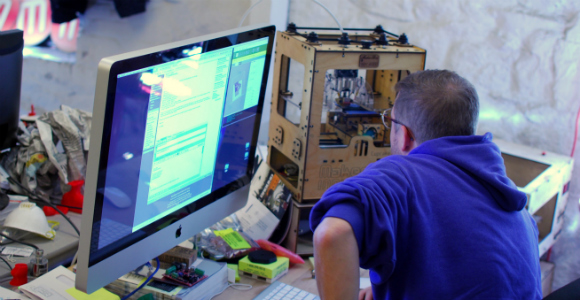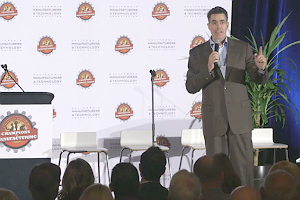
3D printing workstation. (Photo Credit: Nicolás Boullosa/Flickr)
When podcaster Adam Carolla, whose father worked for the Lockheed Skunk Works, kicked off a manufacturing event recently, he started with his own personal story of being a ceramics major in high school and afterward working a series of low-paying jobs.
“Somebody should have tapped me on the shoulder around 15-and-a-half or 16 and said, ‘You’re no Einstein. It’s time for you to learn how to sweat copper pipes,'” said Corolla. “I could have learned something that was useful that would help me support myself and eventually my family.”
“The cause célèbre should be ‘Save shop class,'” Corolla added later.
Finding enough skilled workers for manufacturing jobs was definitely a cause célèbre at a Wednesday event, “Champions of Manufacturing” hosted by the California Manufacturers & Technology Association (CMTA), honoring a varied group of California manufacturers, from a 3D printing company to a business Corolla said was dear to his heart, Sierra Nevada Brewing.
The first “champion” and founder of Sierra Nevada, Ken Grossman gave a little craft beer history lesson, saying, when he started making his hop-forward brew in 1978, there were only 40 total U.S. companies making beer. The brewer also noted that colleges back then still taught skills he needed to build his brewery and “make something himself.”
“And I credit that with a lot of my success..just the ability to do a lot of that myself and to understand the processes that were necessary to make something myself,” said Grossman.
One of the top issues for manufacturers and many California businesses is filling jobs they have available with workers trained with the right skills. A major goal of the California Economic Summit’s Advancing Manufacturing Action Team is promoting training programs for manufacturing in community colleges and universities that meet the skills requirements that industry needs.
The president of a fruit and flavor supplier for yogurt companies (and another “manufacturing champion” of the day), Mike Mulhausen said there’s no reason the state can’t be competitive, as long as governments at all levels create policies that help manufacturers stay competitive. And a strong workforce is one of the reasons he said California Custom Fruits & Flavors has stayed put in the state, besides, of course, the fruit that’s grown nearby.
 “Even if that wasn’t the case, we’d still be committed to California because we find that there’s a great supply of degreed, technical professionals that we use in our lab and our administrative staff and also a great supply of less-skilled but very dedicated, hard-working production workers,” said Mulhausen.
“Even if that wasn’t the case, we’d still be committed to California because we find that there’s a great supply of degreed, technical professionals that we use in our lab and our administrative staff and also a great supply of less-skilled but very dedicated, hard-working production workers,” said Mulhausen.
Recent legislation and grant news have given some focus to workforce and manufacturing issues here in California. A Southern California partnership of aerospace organizations recently won a federal manufacturing competition for grant money and support, another goal of the Summit’s Advancing Manufacturing Action Team.
On the state budget front, career technical education (CTE) got a shot in the arm with a $50 million one-time boost for California Community Colleges to enhance their CTE courses.
As still the biggest manufacturing state in the country, California also has its share of companies on the cutting edge of advanced manufacturing, as shown by another one of CMTA’s “champions,” an Oakland engineering and production company focusing on 3D printing, which will certainly benefit from a workforce with the right skills.
“In 2014 we will definitely have some hires here at FATHOM who do not have college degrees, that have come from organizations that have given them specific skill set training and given them an opportunity they may not have had without that specific training,” said co-founder of FATHOM, Richard Stump, in his company’s video introduction at the event.
It’s certainly a good idea to highlight a company like a 3D printing manufacturer, if the state is looking to change the image of manufacturing from the old one of smokestacks into a high-tech and good-paying opportunity in the eyes of California students.
“We think it’s really important to introduce students at a relatively early age to the opportunity for these kinds of great jobs,” said Dorothy Rothrock, CMTA’s vice president of government relations. “But I have to say, part of our mission here is to improve the image of manufacturing because we are fearful that students don’t see a real future in manufacturing. And we disagree. I think the champions here prove what’s available and, if you’re energetic…you can reach your potential in manufacturing.”
At the state level, there’s been some recognition of the importance of manufacturing in the state with the most manufacturing workers in the country. Kish Rajan, director of the Governor’s Office of Business and Economic Development (GO-Biz), was on hand to tout some of the state efforts, like an exemption of sales and use tax on equipment purchased for manufacturing, biotech or biotech-related research and development, starting on July 1 of this year. Rajan also detailed some of the big numbers showing California has been coming back steadily but acknowledged that there is a long way to go.
“There are far too many people across California who aren’t experiencing that recovery,” said Rajan. “We have got to work harder. And when you think about that big picture mission, manufacturing without question is an enormous priority and an enormous opportunity for California still to advance that kind of growth and prosperity.”

